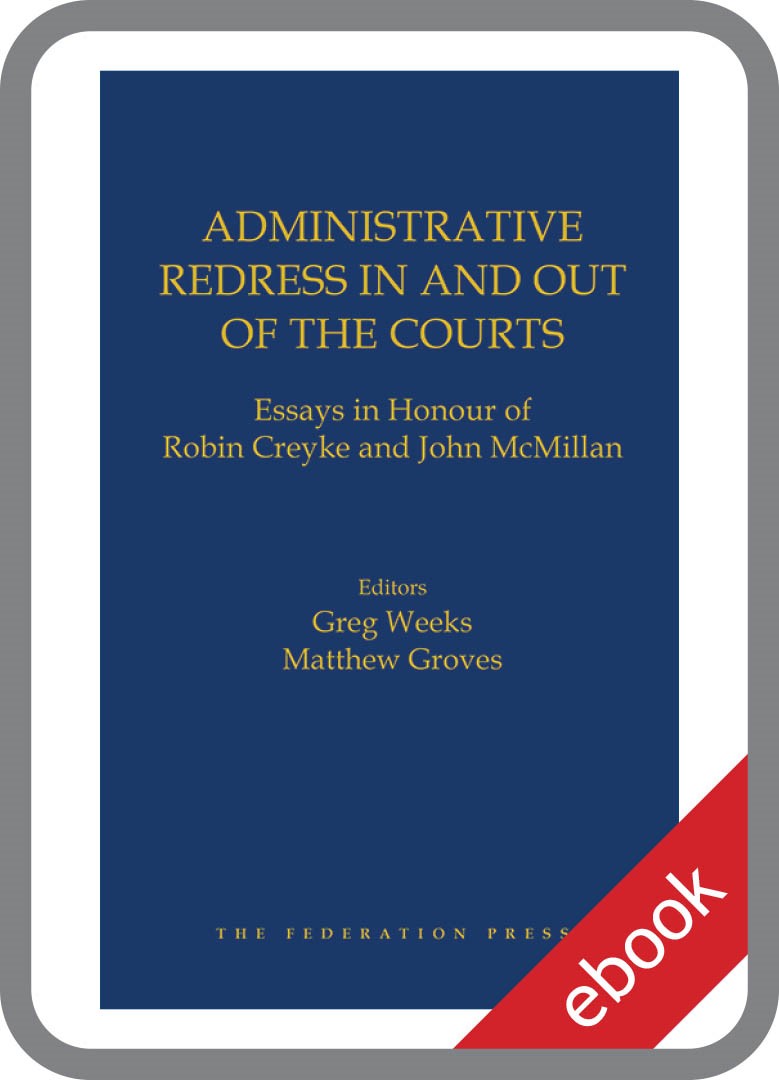This collection of papers by some of Australia’s leading judges, scholars and practitioners focuses on complex public law issues. The book examines executive power, judicial and tribunal review and integrity bodies like Ombudsmen. The opening papers consider separation of powers issues. Justice Stephen Gageler asks if three arms of government remains a suitable model. Do we need a fourth? Greg Weeks’ paper explains how bodies that would be in that fourth arm are vulnerable. Justice John Basten examines key questions between the executive and judiciary, while Justice John Griffiths considers those issues in visa cancellation decisions. Other papers examine different accountability mechanisms – tribunals, Ombudsmen and information. Justice Janine Pritchard explains how litigation processes can obtain otherwise obscure material. Judith Bannister analyses what happens when governments fail to disclose information. Mark Aronson and Anita Stuhmcke each consider what happens when Ombudsmen get drawn into litigation and messy cases. Other papers examine the work of tribunals. Graeme Hill examines the constitutional place of tribunals, especially in light of Burns v Corbett (2018). Linda Pearson explains when and how notions of evidence, proof and satisfaction operate in tribunals. Matthew Groves asks what happens when one of several members of tribunals and other bodies are biased – does the bias of one infect the others?
This book follows The Federation Press’ edited works on public law – Key Issues in Public Law (2018) and Key Issues in Judicial Review (2014) by considering issues not examined in detail in existing works. The book is designed to fill a gap in court and chambers libraries, but also the collection of scholars and students of public law.
Foreword by Wayne Martin AC QC, Chief Justice of the Supreme Court of Western Australia, 2006-2018
About the Contributors
Table of Cases
Table of Statutes
1. The Iceberg of Australian Administrative Law: Justice Before and Beyond Judicial Review
Matthew Groves and Greg Weeks
2. Three is Plenty
Stephen Gageler
3. Attacks on Integrity Offices: A Separation of Powers Riddle
Greg Weeks
4. The Courts and The Executive: A Judicial View
John Basten
5. Review of Visa Cancellation or Refusal Decisions on Character Grounds: A Comparative Analysis
John Griffiths
6. Administrative Law’s Impact on the Bureaucracy
Janina Boughey
7. More Reasons for Giving Reasons
Janine Pritchard
8. Failure to Disclose: What are the Consequences When Open Government Founders?
Judith Bannister
9. Ombudsman Litigation: The Relationship between the Australian Ombudsman and the Courts
Anita Stuhmcke
10. Ombudsmen and Crime Busters: Ships Passing in the Night
Mark Aronson
11. State Tribunals and the Federal Judicial System
Graeme Hill
12. Tribunals: Evidence, Satisfaction and Proof
Linda Pearson
13. Does One Rotten Apple Spoil the Whole Barrel? Bias in Multi-Member Decision-Making
Matthew Groves
14. The Uncertainty of Certainty in Legislation
Dennis Pearce
Index
The book in truth commends itself, as a list of the judges, scholars and practitioners and their papers shows….
The issues the book addresses are complex but fundamental and may well have greater appeal to graduates, practitioners and academics than to law students in their early years. It is a rich collection.
This is another important and stimulating legal book published by The Federation Press.
Justice Alan Robertson, Federal Law Review, (2020) vol 48 no 2
This text was written to commemorate and celebrate the achievements of two well-known “legends” of Australian administrative law: Professor Robin Creyke AO and Professor John McMillan AO. The text boasts impressive contributors, ranging from Justice Stephen Gageler to Mark Aronson. … The chapters cover topics likely to be of great interest to many, being broad-ranging in their focus and including both theoretical and practical matters. …
There can be no doubt that – much like the foundational works of Creyke and McMillan which it celebrates – this book would make a valuable addition to the library of anyone practising, or with an interest, in this area.
B Kabel, Queensland Law Reporter, (2019) vol 39
Robin Creyke and John McMillan are two of the most respected administrative law scholars in Australia. Their contribution has been characterised by three things – a dedication to teaching, a significant contribution to scholarship and extensive practical experience in public administration. It is therefore warranted that a collection of essays has been published in honour of their contribution to the field. This volume is infused with many of the principles and qualities which are associated with Creyke and McMillan: nuanced and considered legal analysis underpinned by practical insights, and an emphasis on values of openness and transparency. This volume is also, despite the complexities of some of the material, a very accessible and engaging read. In this age of twitter, blogs and live-streamed court hearings, it was very refreshing to read a collection which was so reflective in nature and which discussed not only administrative law principles themselves, but their impact upon governmental institutions and culture. For the full review please click here.
Dr Maria O’Sullivan, The Australian Journal of Admin Law, (2019) vol 27 no 1







